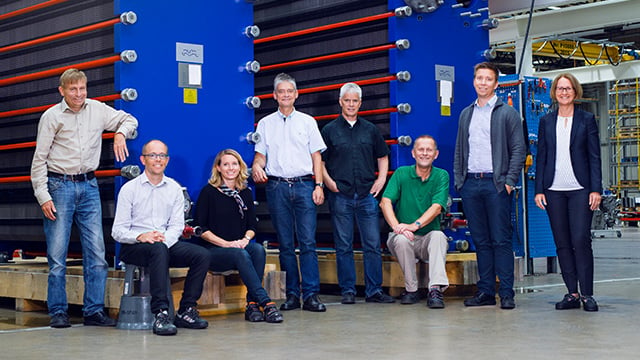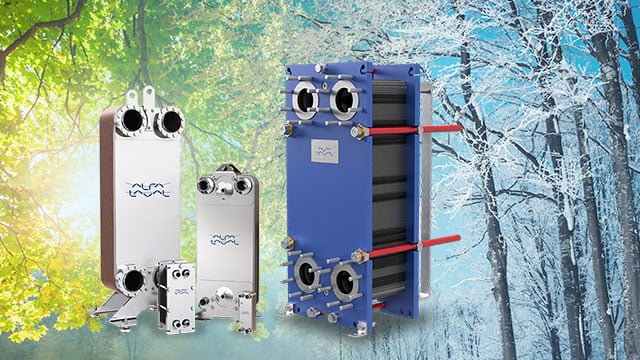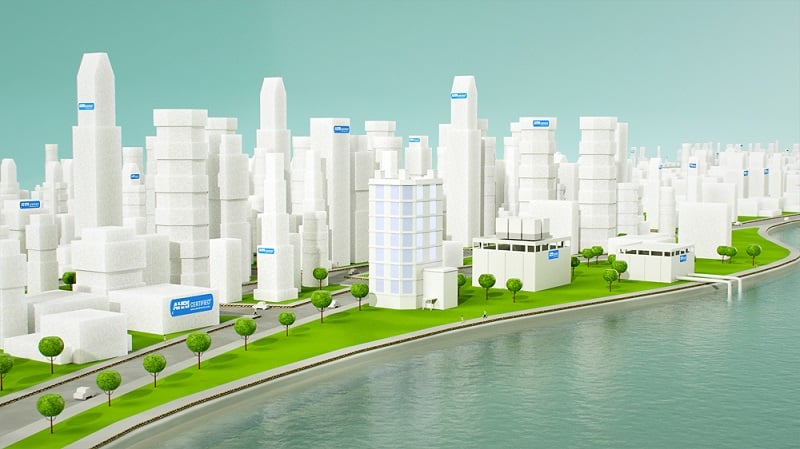AHRI performance certification
When suppliers of heat exchangers apply large sizing tolerances, it creates uncertainty about heat exchanger performance. However, there is a solution that can remove this uncertainty – AHRI performance certification – the only global third-party performance certification for plate heat exchangers.
How to eliminate uncertainty about thermal performance in plate heat exchangers
For many years it has been a common practice in the plate heat exchanger industry to “adjust” or tweak heat duty calculations. Manufacturers manipulate calculations so that component costs can be minimized and a smaller plate heat exchanger can be offered at an attractive price. However, the result is that end customers get under-dimensioned heat exchangers, leading to higher system-wide energy use, higher operating costs and compromised environmental performance.
These “recalculations” makes it harder to choose a heat exchanger that will provide the required performance and increases the risk that it will underperform. It creates uncertainty for everyone involved in recommending, selecting and using heat exchangers – consultants, specifiers and end customers – and undermines confidence in the industry as a whole. The degree of under-dimensioning has been growing year by year and it has become the plate heat exchanger industry’s biggest problem.
Certification ensures certainty about performance
There is one sure way to ensure certainty right from the start – AHRI performance certification.
The Air-Conditioning, Heating, and Refrigeration Institute (AHRI) is the only independent organization that certifies the performance of liquid-to-liquid heat exchangers globally. AHRI is a non-profit organization.
The AHRI Certification Program provides third-party verification of thermal performance – it gives independent assurance that the plate heat exchanger will perform in accordance with the manufacturer’s published ratings.
The benefits of performance certification
The wider adoption of AHRI performance certification makes sense for all concerned:
- Lowers energy consumption and reduces lifetime operating costs significantly by assuring a more energy-efficient system.
- Ensures full investment value by reducing costs for field tests and additional component performance margins.
- Enables fair comparisons of thermal performance and price/performance ratio, as calculations have been verified.
- Ensures that targets for power consumption and climate control can be met by adequate dimensioning of the heat exchanger capacity.
- Provides peace of mind for those who rely on system performance – suppliers, consultants, contractors and end users.
- Places focus on energy efficiency, which fosters innovation and stimulates manufacturers to develop more efficient products.
- Eliminates cheating from thermal performance, which enhances confidence in the industry.
Alfa Laval has chosen to take an active role in promoting AHRI certification.
From every perspective, AHRI performance certification is better for everyone involved in the process of designing, producing, selecting and operating plate heat exchangers.
We believe that performance certification is an important step in creating a sound plate heat exchanger market and benefits the industry as a whole.
For more information on AHRI certification read The case for thermal performance certification and visit the official AHRI website.
AHRI certification programs:
The hidden cost of non-certified plate heat exchangers in your cooling plant
HVAC systems typically account for as much as 30% of energy use and costs in commercial buildings and office spaces. Plate heat exchangers are a key equipment component to save energy and improve a building's sustainability and carbon footprint.
Chiller evaporator
Due to an undersurfaced plate heat exchanger, if the fan coils received 1°C higher cooling temperature, the chiller evaporation temperature will be lower, causing a higher lift.
- 3.5% higher chiller energy consumption
Chiller condenser
Due to an undersurfaced plate heat exchanger, if the chiller condenser receives 1°C higher cooling source, the condensation temperature will increase, causing a higher lift.
- 1.5% higher chiller energy consumption
AHRI in brief
The Air-Conditioning, Heating, and Refrigeration Institute (AHRI) is administrating a large number of performance certification programs, mainly for products intended for the HVAC industry. The AHRI Product Performance Certification Program is a voluntary program, administered and governed by AHRI, which ensures that various types of heating, ventilation, air conditioning, refrigeration, and water heating products perform according to manufacturers’ published claims. Products that are certified through the AHRI Product Performance Certification Program are continuously tested, at the direction of AHRI, by an independent third–party laboratory, contracted by AHRI, to determine the product’s ability to conform to one or more product rating standards or specifications.
For plate heat exchangers the performance certification programs are called LLHE (Liquid to Liquid Heat Exchangers Certification Program) and LLBF (Liquid to Liquid Brazed and Fusion Bonded Plate Heat Exchangers Certification Program).
Products that are certified through the AHRI Product Performance Certification Programme are continuously tested, at the direction of AHRI, by an independent third-party laboratory, contracted by AHRI, to determine the product’s ability to conform to one or more product rating standards or specifications.
AHRI certification at Alfa Laval
You may also like to explore
Demand new standards
Introducing the world’s most modern Gasketed plate heat exchangers. Discover how our next-generation line of gasketed plate heat exchangers will bring you higher efficiency, better reliability and greater serviceability.

Consultant? System integrator?
Are you a consultant? Look here! With expertise from decades of experience in heat exchange, Alfa Laval offers knowledgeable resources for today’s heating and cooling challenges. Discover answers to complex questions on everything from energy efficiency to natural refrigerants, along with helpful tools that make it simpler to find the right technology for your application.


